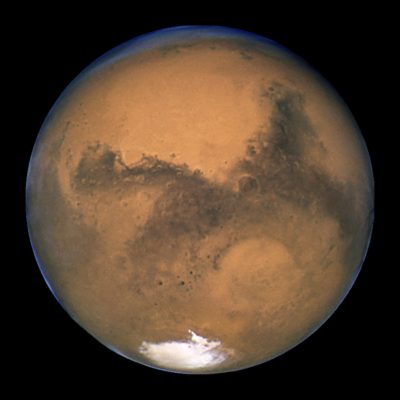
In 1969, we put a man on the moon. In 2024, will we put someone on Mars? Elon Musk, founder and CEO of SpaceX, thinks we can and will. This feat is planned to be accomplished by SpaceX’s BFR, which stands for Big Falcon Rocket — otherwise known as Big F**king Rocket.
The prospect of an age of interplanetary space travel and Mars colonization is quickly approaching — ready or not.
Musk revealed his plan at the 68th International Astronautical Congress in Australia on Sept. 29. The BFR will be more powerful than any previous SpaceX creations, with the capacity to hold about 100 people, and return to Earth unharmed. The rocket is also predicted to become a model for both space and Earth travel alike, cutting journey time significantly.
“It’s an admirable goal, but I think if you look at some of his [Musk’s] other timelines for a lot of other projects, I think you’ll quickly find out that he is very much an optimist,” said Andy Whitman, a junior in the College of Engineering and an executive board member for the Boston University Astronomical Society. “That’s totally fine. I think he does that to drive everybody.”
Devin de Hueck, a College of Arts and Sciences freshman and a follower of Musk’s work, agrees that Musk is an optimist, saying the Mars journey is “possible, but it’s unlikely … There’s a joke that whenever Elon puts out a time, it’s called ‘Elon time.’”
This skepticism of the delivery of promises on space expeditions is not exclusive to SpaceX. NASA has been discussing travel to Mars for years and has yet to produce tangible results. Though they laid the foundation of sending the rovers, the government organization does not have the funds to make it likely to send a man to Mars in the near future.
“It’s been stated as ‘15 years from now’ for a very long time,” Paul Withers a professor in the astronomy department at BU wrote in an email. “I expect that it will still be ‘15 years from now’ for many years to come.”
Contrary to some people’s skepticism, Musk seems confident in SpaceX’s ability to send a cargo mission by 2022 and a crewed mission by 2024 due to recent developments in the company’s financial approach to the expedition.
They plan to remove all smaller spacecraft such as the Falcon 9, Dragon and Falcon Heavy from use to preserve all funds and resources for the BFR. In addition, the BFR will be the world’s first completely reusable rocket. The ability of the rocket to drop people off on Mars then return and do it again will usher in a new, more affordable, accessible and high-speed age of space travel.
Withers hasn’t caught on to Musk’s optimism, since it’s too early to discuss how Mars travel and colonization will affect life on Earth, he wrote.
“The colonization of Mars will occur too far into the future for me to have any sense of what the world will be like at the time this event happens,” Withers wrote. “So predicting how the world will change in response to that event is hard. More probable is that initial exploration of Mars is similar to present-day exploration of Antarctica.”